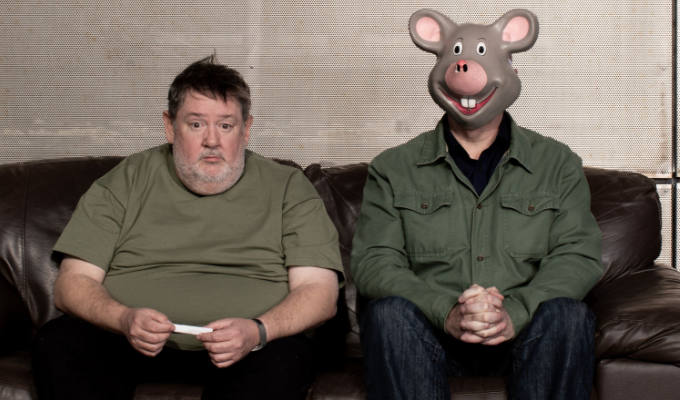Squawker new act final 2012
Review by Steve Bennett at Brighton Komedia
Everywhere you look there are new act competitions these days, and now Brighton – rather belatedly given its vibrant open mic scene – has got in on the act with the Squawker. Tied in to the city’s comedy festival, and run by local comedy course maven Jill Edwards, it comes with a £500 top prize.
The final, at Komedia last night, very much had the flavour of dozens of similar events: a generous handful of comics able to hold the stage and get the laughs but largely by playing it safe and following the track lines of the observational comedians who went before, rather than projecting too much of their own personality.
Opening act Paul Jones chose rather an obscure comic to emulate in Gary Delaney, whose dry one-liners have given him some cult kudos, but is only just breaking into Mock The Week familiarity. Jones shares both a cadence and a love of warped linguistics with Delaney, and his semi-deadpan one-liners contained some fine examples of the genre.
The set is still hit-and-miss, but the best evoke witty scenes with an impressive efficiency of precise language, from the ancient frozen food embedded in his freezer ice to reading Mein Kampf on the train. It’s a nicely put-together set, and once he weeds out the weaker jokes and finds a slightly different way to deliver it all, Jones could have a strong set.
Stuart Hossack offers up some quirky ideas, but his distant presentation style – almost delivering his routines as if they were mini-comedy sketches – makes it difficult for him to connect to the audience. So too does displaying whimsical cartoons he’s drawn on A4 sheets of paper that you can’t see at the back of a proper-sized room. He needs a contingency for when he breaks out of tiny open-spot venues.
The spoof motivational speaker shtick is also too well-mined for him to really discover anything new therein, so while his slightly eccentric approach is intriguing, it doesn’t convert into quite enough funnies to make him a stand-out.
Sam Savage has a brusque Essex charm that sees right through pretension, refreshing for it’s directness. To call her the female Micky Flanagan would give a decent impression of her no-nonsense attitude, even if it greatly overstates her current writing abilities.
There are some good lines here, about finding life dull or deciphering an uplifting epithet, but sometimes she over-estimates the mileage she can get out of recognition of something like a terrible perm, without really adding her own comic elements. Still, in persona she’s a comedy natural; stronger material could yet come.
Glaswegian John Tansey is another act who shows some promise, but needs some time to develop more imaginative material. His stock in trade is deconstructing some Biblical myths, which many, better, comics have done before.
Despite the odds being so stacked against him, he comes up with an original take on the Noah’s Ark tale - let down with a really formulaic ‘...and then I got off the bus’-style get-out. However his take on Abraham being willing to sacrifice Isaac to a rather needy God seems a lot more obvious.
Dan McKee also follows familiar comic tropes in taking things he sees or hears literally. The incorrect use of the word ‘literally’ being one of them. He has similar problems with man-sized tissues, occasional tables, and blokes being described as ‘a legend’. This used to just be comic pedantry, but these days it’s diagnosed, and all part of McKee’s Asperger’s. That’s as may be but taking things at face value is a rather easy comic route, and there are few surprises here. Literally.
Norwegian Ingrid Dahle offers something genuinely different in her act. Manipulating a £5 pair of Primark trousers into alternative outfits might not immediately seem like comic gold, but Dahle has a gift for quirky physical comedy. Her son’s glasses and an imaginary penis are later drafted into action for another couple of inventive set pieces.
For verbal comedy, she has a nice segment about learning English from the Jeremy Kyle Show, which body-swerves the cliche thanks to her uncanny ability to mock our accents. Dahle will probably never be mainstream, but mark her out for an alternative hero of the future. The judges seemed to see that promise, too, and awarded her the inaugural Squawker title.
We should probably skip quickly past Steven Skilling. The 20-year-old Scot just unloaded some petulant teenage arguments with his mum (‘you treat this place like a hotel!’) then described fairly faithfully what happens on Take Me Out, wishing it would be *more* explicit. But he added very little to the monologue we all have about these things, simply describing what happens. He’s fallen into the biggest trap of observational comedy: thinking it’s easy.
He ends with a big chunk mocking Stephen Hawking’s physical limitations, during which he absent-mindedly confesses: “I had to Wikipedia him to find out what he did for a living’ – so accidentally revealing he’s only really cracking jokes about the eminent physicist because others did (or at least they used to, a few years ago) – rather than because he had original thoughts he wanted to share.
Much more assured work came from Funmbi Omotayo, a soft-spoken Anglo-Nigerian with some thoughtful observations on race, delivered in a charismatically calm and collected manner that’s mildly self-deprecating, rather than stridently political.
He has a couple of mis-steps – mistaking the Olympic Torch for a giant spliff seems cheap – but his first-hand anecdotes charm and amuse in equal manner. Of all the new acts tonight, he felt closest to the finished article, and must only have narrowly missed the title.
Laurie Rowan was lighter on the laughs, but demonstrates a great storytelling ability, deftly transporting us back to his childhood in a small North Wales community, where every tiny faux pas was enough to condemn the teenage Rowan as ‘gay’, and deserving of a beating.
He’s an outsider in this world of outsiders, and the jokes – although fairly widely-spaced because of the scene-setting – ring with authenticity. It’s easy to envisage him writing a sitcom based in this village some years hence.
Finally, the extremely personable Laura Lexx, all jolly Somerset middle-class positivity, which she contrasted with the grittier atmosphere in South London’s Elephant and Castle, where she moved to.
This, and other material about looking so young she could be used as paedophile bait or going though an extended boyfriend-free dry patch, is all moderately amusing - but nothing that hasn’t been heard before. She’s upbeat and delightful in personality, but that’s only half the comedy recipe.
So, all-in-all, a fair reflection of the state of the best of the open mic scene: a broadly entertaining night with a range of voices, but none (Dahle excepted) too far from what the circuit already has... but what it always wants more of.
Published: 18 Oct 2012






